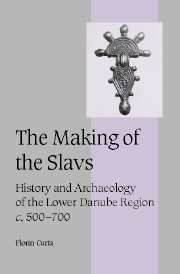Crossref Citations
This Book has been
cited by the following publications. This list is generated based on data provided by Crossref.
Brather, Sebastian
2004.
The beginnings of Slavic settlement east of the river Elbe.
Antiquity,
Vol. 78,
Issue. 300,
p.
314.
Gillett, Andrew
2006.
Ethnogenesis: A Contested Model of Early Medieval Europe.
History Compass,
Vol. 4,
Issue. 2,
p.
241.
Curta, Florin
2007.
Paradigms and Methods in Early Medieval Studies.
p.
61.
Acta Archaeologica, Editors
2007.
Preliminary Material.
Acta Archaeologica,
Vol. 78,
Issue. 2,
p.
1.
Bowlus, Charles R.
2007.
Paradigms and Methods in Early Medieval Studies.
p.
185.
Kornbluth, Genevra
2007.
Paradigms and Methods in Early Medieval Studies.
p.
23.
Shepard, Jonathan
2008.
The Cambridge History of Christianity.
p.
130.
Noble, Thomas F. X.
and
Smith, Julia M. H.
2008.
The Cambridge History of Christianity.
Shepard, Jonathan
2009.
The Cambridge History of the Byzantine Empire c.500–1492.
Forker, Martin
and
McCormick, Jonathan
2009.
Walls of history: the use of mythomoteurs in Northern Ireland murals.
Irish Studies Review,
Vol. 17,
Issue. 4,
p.
423.
Thurston, Tina
2009.
Unity and Diversity in the European Iron Age: Out of the Mists, Some Clarity?.
Journal of Archaeological Research,
Vol. 17,
Issue. 4,
p.
347.
Crabtree, Pam
2009.
The Archaeology of Medieval Europe.
History Compass,
Vol. 7,
Issue. 3,
p.
879.
Gregory, Timothy E.
2010.
Commentary: Medieval and Post-Medieval Archaeology of Greece.
International Journal of Historical Archaeology,
Vol. 14,
Issue. 2,
p.
302.
Caraher, William R.
2010.
Abandonment, Authority, and Religious Continuity in Post-Classical Greece.
International Journal of Historical Archaeology,
Vol. 14,
Issue. 2,
p.
241.
Brather, Sebastian
2011.
The Western Slavs of the Seventh to the Eleventh Century - An Archaeological Perspective.
History Compass,
Vol. 9,
Issue. 6,
p.
454.
Maxwell, Alexsander
2011.
Herder, Kollár, and the Origins of Slavic Ethnography.
Traditiones,
Vol. 40,
Issue. 2,
Syrbe, Daniel
2012.
Reiternomaden des Schwarzmeerraums (Kutriguren und Utiguren) und Byzantinische Diplomatie im 6. Jahrhundert.
Acta Orientalia Academiae Scientiarum Hungaricae,
Vol. 65,
Issue. 3,
p.
291.
Reimitz, Helmut
2012.
The Encyclopedia of Ancient History.
2012.
Nations.
p.
388.
Wiewiorowski, Jacek
2012.
The Defence of the Long Walls of Thrace (Μακρά Τείχη τῆς Θρᾴκης) under Justinian the Great (527–565 A.D.).
Studia Ceranea,
Vol. 2,
Issue. ,
p.
181.



